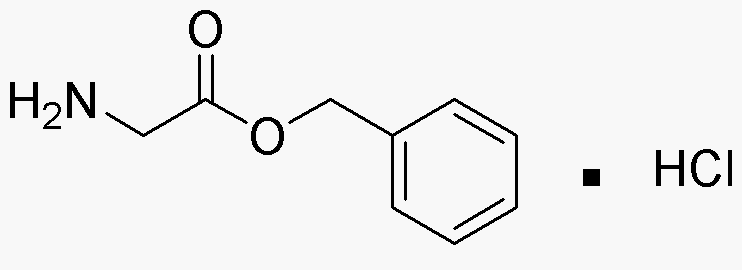Glycine benzyl ester hydrochloride is widely utilized in research focused on:
- Pharmaceutical Development: This compound serves as an important intermediate in the synthesis of various pharmaceuticals, particularly those targeting neurological disorders, enhancing drug efficacy and specificity.
- Peptide Synthesis: It is commonly used in the production of peptides, facilitating the formation of peptide bonds, which is crucial in developing new therapeutic agents.
- Biochemical Research: Researchers utilize it in studies related to amino acid metabolism and protein synthesis, providing insights into cellular processes and disease mechanisms.
- Cosmetic Formulations: The compound is incorporated into skincare products for its moisturizing properties, helping to improve skin hydration and overall texture.
- Food Industry: It can be used as a flavor enhancer or additive, contributing to the development of food products with improved taste profiles.
General Information
Properties
Safety and Regulations
Applications
Glycine benzyl ester hydrochloride is widely utilized in research focused on:
- Pharmaceutical Development: This compound serves as an important intermediate in the synthesis of various pharmaceuticals, particularly those targeting neurological disorders, enhancing drug efficacy and specificity.
- Peptide Synthesis: It is commonly used in the production of peptides, facilitating the formation of peptide bonds, which is crucial in developing new therapeutic agents.
- Biochemical Research: Researchers utilize it in studies related to amino acid metabolism and protein synthesis, providing insights into cellular processes and disease mechanisms.
- Cosmetic Formulations: The compound is incorporated into skincare products for its moisturizing properties, helping to improve skin hydration and overall texture.
- Food Industry: It can be used as a flavor enhancer or additive, contributing to the development of food products with improved taste profiles.
Documents
Safety Data Sheets (SDS)
The SDS provides comprehensive safety information on handling, storage, and disposal of the product.
Product Specification (PS)
The PS provides a comprehensive breakdown of the product’s properties, including chemical composition, physical state, purity, and storage requirements. It also details acceptable quality ranges and the product's intended applications.
Certificates of Analysis (COA)
Search for Certificates of Analysis (COA) by entering the products Lot Number. Lot and Batch Numbers can be found on a product’s label following the words ‘Lot’ or ‘Batch’.
*Catalog Number
*Lot Number
Certificates Of Origin (COO)
This COO confirms the country where the product was manufactured, and also details the materials and components used in it and whether it is derived from natural, synthetic, or other specific sources. This certificate may be required for customs, trade, and regulatory compliance.
*Catalog Number
*Lot Number
Safety Data Sheets (SDS)
The SDS provides comprehensive safety information on handling, storage, and disposal of the product.
DownloadProduct Specification (PS)
The PS provides a comprehensive breakdown of the product’s properties, including chemical composition, physical state, purity, and storage requirements. It also details acceptable quality ranges and the product's intended applications.
DownloadCertificates of Analysis (COA)
Search for Certificates of Analysis (COA) by entering the products Lot Number. Lot and Batch Numbers can be found on a product’s label following the words ‘Lot’ or ‘Batch’.
*Catalog Number
*Lot Number
Certificates Of Origin (COO)
This COO confirms the country where the product was manufactured, and also details the materials and components used in it and whether it is derived from natural, synthetic, or other specific sources. This certificate may be required for customs, trade, and regulatory compliance.

